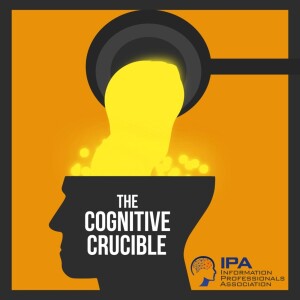
#130 Teasel Muir-Harmony on Spaceflight, Foreign Policy, and Soft Power
 2023-01-10
2023-01-10
The Cognitive Crucible is a forum that presents different perspectives and emerging thought leadership related to the information environment. The opinions expressed by guests are their own, and do not necessarily reflect the views of or endorsement by the Information Professionals Association.
During this episode, Dr. Teasel Muir-Harmony of the Smithsonian discusses her book, Operation Moonglow. She argues that its primary purpose wasn't advancing science; rather, it was part of a political strategy to build a global coalition. Operation Moonglow paints a riveting picture of the intersection of spaceflight, geopolitics, propaganda, and diplomacy during the Cold War.
Research Question: Dr. Muir Harmony believes more work is needed for evaluating the impact of information dissemination in a public diplomacy context.
Resources:
- Dr. Teasel Muir-Harmony
- Operation Moonglow: A Political History of Project Apollo by Dr. Teasel Muir-Harmony
- Kurzgesagt – In a Nutshell
- How to Build a Dyson Sphere - The Ultimate Megastructure
- How to Move the Sun: Stellar Engines
Link to full show notes and resources
https://information-professionals.org/episode/cognitive-crucible-episode-130
Guest Bio:
Dr. Teasel Muir-Harmony is a historian of science and technology and the curator of the Apollo Collection. Before coming to the Smithsonian, she earned a Ph.D. from the Massachusetts Institute of Technology (MIT). She has held positions as a visiting scholar at the Royal Institute of Technology in Sweden (KTH), an Associate Historian at the American Institute of Physics, and as a curator at the Adler Planetarium and Astronomy Museum in Chicago.
Muir-Harmony researches and writes on the history of exploring the Moon, from debates about lunar governance to the use of spaceflight as soft power, the topic of her award-winning book, Operation Moonglow: A Political History of Project Apollo (Basic Books, 2020). She is the author of Apollo to the Moon: A History in 50 Objects (National Geographic, 2018) and an advisor to the television series Apollo’s Moon Shot. Her scholarship has been featured by CBS, the New York Times, NPR, the Wall Street Journal, the Washington Post, and numerous other media outlets. Muir-Harmony’s research and writing have been supported by the Daniel and Florence Guggenheim Foundation, the Consortium for the History of Science, Technology, and Medicine, the MIT Presidential Fellowship, the Smithsonian Institution Graduate Research Fellowship, NASA’s Science Mission Directorate, and the National Science Foundation.
At the Air and Space Museum, she is the lead curator for the One World Connected gallery and serves on exhibit teams for Destination Moon and the Allan and Shelley Holt Innovations Gallery. Her collection comprises over 2,000 artifacts related to the Apollo program, the Skylab program, and the Apollo-Soyuz Test Project.
Muir-Harmony co-organizes the Space Policy & History Forum, serves on the Executive Council of the Society for the History of Technology, is a member of the American Astronautical Society History Committee, and participates in the US State Department’s Speakers Program. In addition, she teaches in Georgetown University’s Edmund A. Walsh School of Foreign Service.
About: The Information Professionals Association (IPA) is a non-profit organization dedicated to exploring the role of information activities, such as influence and cognitive security, within the national security sector and helping to bridge the divide between operations and research. Its goal is to increase interdisciplinary collaboration between scholars and practitioners and policymakers with an interest in this domain.
For more information, please contact us at communications@information-professionals.org.
Or, connect directly with The Cognitive Crucible podcast host, John Bicknell, on LinkedIn.
Disclosure: As an Amazon Associate, 1) IPA earns from qualifying purchases, 2) IPA gets commissions for purchases made through links in this post.
More Episodes
 2022-08-08
2022-08-08
 2022-08-02
2022-08-02
 2022-06-21
2022-06-21
 2022-06-10
2022-06-10
 2022-05-24
2022-05-24
 2022-05-03
2022-05-03
 2022-04-19
2022-04-19
 2022-04-12
2022-04-12
Create your
podcast in
minutes
- Full-featured podcast site
- Unlimited storage and bandwidth
- Comprehensive podcast stats
- Distribute to Apple Podcasts, Spotify, and more
- Make money with your podcast
It is Free
- Privacy Policy
- Cookie Policy
- Terms of Use
- Consent Preferences
- Copyright © 2015-2024 Podbean.com





